An American in Vietnam
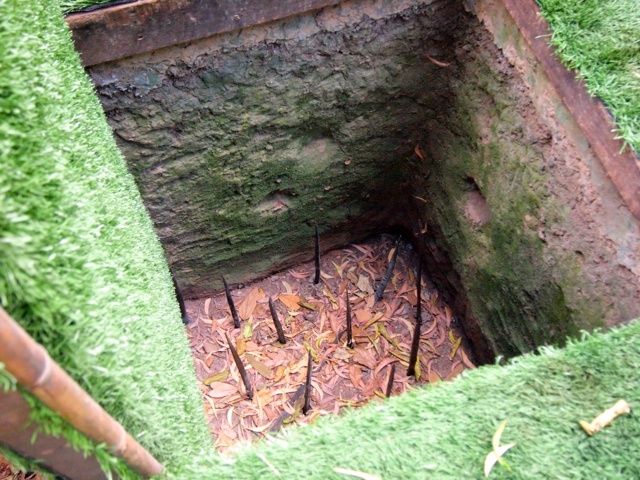
Our guide was almost gleeful as he described the booby traps to us. Pointing out the sharp, rusted bits of metal repurposed from blown-out tanks and unexploded bombs that would be driven through the soft, fleshy bits of enemies.
One by one, he described them. Demonstrating with his words how they worked. Traps that would drive nails through the neck and armpits; traps that would release a swinging beam full of metal spikes through an opened doorway; traps that would catch and mangle feet and ankles.
“These are for American soldiers,” our guide said with a slight smile. A glint in his eye told me that he would have been happy to have witnessed some of them in action.
Our guide's opinion toward “American soldiers” at the Cu Chi Tunnels is not an uncommon one in many parts of Vietnam. After all, he told us that several of his immediate family members (a father, an uncle) fought against the U.S. troops back in the '60s and '70s in what is usually referred to by my country as the Vietnam War.
In my guide's country, though? Here, it was the American War.
There are plenty of things my country has done in the past that I am not proud of. Slave ownership and abuse. Internment camps during WWII. And, of course, the Vietnam War.
In high school, the Vietnam conflict took up a large portion of my American history class. We learned about the terrible things that BOTH sides did to each other; about napalm and Agent Orange and booby traps and barbaric massacres of innocent people. We read books. We watched movies. But it's still not an easy war to dissect, mostly because of the fact that the war is still a very controversial one. And it's also not always easy to succinctly explain WHY we were fighting in the jungles of Vietnam in the first place.
The non-Americans in my Cu Chi tour group were perplexed by this. “But why was the war begun?” they kept asking. I would just shift uncomfortably because I didn't have a simple answer. Maybe there IS no simple answer. “To stop communism,” we usually say. But it was more complicated than that.
The fact of the matter is that my country invaded another. Innocent people died; whole cities were destroyed; horrific gases and poisons were used that have left both physical and mental scars on the people who survived.
I could sort of understand, then, when my guide at the Cu Chi Tunnels made off-color comments about Americans; when he made fun of our fat asses as we tried to climb down into the tiny tunnel entrances. It's not like this war happened 100 years ago. For many people in Vietnam, it is still very fresh in their minds. Especially at a place like this, where the war is discussed every day.
At the Cu Chi Tunnels, hundreds — maybe thousands — of tourists show up each day to marvel at the tiny hidden entrances that lead to more than 200 kilometers (125 miles) of underground tunnels around Saigon. Tunnels that people not only hid and fought in, but tunnels that they actually LIVED in for years. The tourists laugh at one another trying to squeeze into these tunnels; snap some photos and maybe pay money to shoot a machine gun.
They listen to the presentation about the booby traps, and then watch an old newsreel video showing Viet Cong soldiers shooting guns and receiving awards for being “American Killer Heroes” before being herded back out the front gates.
This was the point where I found myself conflicted.
On the one hand, war is war. People kill one another and are awarded medals and honors for it. I realize that. Politicians in my own country run on platforms built around the fact that they are “war heroes.” It should not have been a shock that it's the same in Vietnam.
On the other hand, being confronted by something bad that your country did in the past and then being asked to feel guilty about it… that is something else entirely. It's true that it's not always pleasant to be presented with unfortunate or uncomfortable truths. But, mostly thanks to our tour guide, I almost felt under attack by the time I left the Cu Chi Tunnels, despite the fact that I was not even alive when the U.S. went to war in Vietnam. If I had been, I certainly would not have supported it.
The next day we visited the War Remnants Museum in Saigon — a museum containing a good deal of one-sided, anti-American propaganda.
Even though there WAS a small section on protests against the war in the U.S., again, I felt as though the popular tourist attraction was begging for me to claim some sort of responsibility as an American. To walk through the rooms of disturbing photos (which comprise the majority of the museum) and feel guilty about them.
On the one hand, I suppose this is fair. The U.S. really has never apologized for what it did in Vietnam (or in Laos or Cambodia — in fact, the government is still unwilling to admit that we did ANYthing in some of these places). It is fair to want to place blame and demand that guilt be felt. After all, I would probably feel the same way if the roles had been reversed and it was MY country being invaded and bombed and poisoned like Vietnam was.
But I'm not sure that these one-sided tourist attractions are the way to ask for that responsibility to be claimed.
Don't get me wrong — I'm glad that places like the Cu Chi Tunnels and the War Remnants Museum exist. What the U.S. did in Southeast Asia in the 1960s and '70s was largely uncalled for and needlessly brutal. It dropped more than 3 times as many tons of bombs during the Vietnam War than in the whole of WWII. Which is ridiculous.
And it's right for Vietnam to want the U.S. to take responsibility.
The thing is, in places like the War Remnants Museum (and also to some extent at the Cu Chi Tunnels) Americans are made out to be monsters.
And it's true, of course, that some American soldiers did some monstrous things in Vietnam. We've all seen the photos and read the stories; we've learned about the My Lai Massacre and can picture Napalm Girl in our minds.
But what these places don't tell you is that the majority of young Americans sent to fight in Vietnam did not go willingly. The war, overall, was not popular in the United States. In fact, there were massive, sometimes violent protests against it — 4 students at my alma mater of Kent State University lost their lives in 1970 protesting this war.
The U.S. government enacted a draft to conscript troops to send over to Southeast Asia in 1969, and most of the soldiers sent there had no choice. This of course doesn't excuse the inhumane things that some of them did; but it's worth remembering that there are always two sides to every story — especially when war is involved.
In many cases, the American troops suffered just as much as the Vietnamese did. They developed drug addictions. They suffered traumas. They, too, were affected by things like Agent Orange. Most Americans today will agree that the Vietnam War was a war we should have never been fighting.
But these are things that museums and tourist attractions in Vietnam will barely tell you, if at all.
Before I went to Vietnam, I had a lot of people expressing concerns for my safety.
After all, I was an American traveling to Vietnam. Wouldn't that be dangerous?
Well actually, no. Yes, it's true that the American soldiers who fought here decades ago are still hated in many parts of Vietnam. And some people (perhaps like my guide at the Cu Chi Tunnels) still harbor sour feelings toward the U.S.
But, in most places, nobody had anything bad to say about my being an American. I felt welcomed. I felt safe. I won't say that they've forgotten… just that they are moving past it and realizing that I am not the one responsible for the bombs that fell in their country all those years ago. Other than that one tour guide at the Cu Chi Tunnels, I did not meet one person in Vietnam who narrowed their eyes at me upon learning that I was American.
The people of this country realize that not all Americans are evil, and are able to differentiate between me (a tourist interested in learning about their country) and the American government that sent boys with guns here 40 years ago.
The problem is that the government-run museums and tourist attractions don't really reflect this attitude.
So what's the whole point of this post? Well, to be honest, I'm not sure I have one. War is never an easy topic to address, especially a war with such confusing motivations and devastating consequences.
Visiting the Cu Chi Tunnels and the War Remnants Museum forced me, an American, to look at the Vietnam War slightly differently. They forced me to see it through other eyes — eyes of the locals, and eyes of non-American tourists, many of whom were learning about the conflict for the first time.
Did the one-sidedness bother me? Yes. But did it also make me look in the hypothetical mirror a bit differently? Yes, it did that, too.
I don't have a solution for dealing with tourist sites like the Cu Chi Tunnels and War Remnants Museum. Do I believe that these places are biased in the information they share and the manner in which it is presented? Yes, I definitely do.
But do I, as an American, have any right to demand that they be changed?
No, I don't believe that I do.
All I ask is that, if you visit these places yourself, keep in mind that you are only being shown part of the story.
And remember that these types of propaganda-heavy attractions do not necessarily reflect the overall opinions of people living in Vietnam today.
Have you been to any of these sites? Would you want to go as an American?
*Note: I visited these sites as part of a complimentary tour of Vietnam and Cambodia with Intrepid Travel. The guide at the Cu Chi Tunnels mentioned in this post was not affiliated with Intrepid at all. As always, opinions and observations are completely my own.

Amanda Williams is the award-winning blogger behind A Dangerous Business Travel Blog. She has traveled to more than 60 countries on 6 continents from her home base in Ohio, specializing in experiential and thoughtful travel through the US, Europe, and rest of the world. Amanda only shares tips based on her personal experiences and places she's actually traveled!

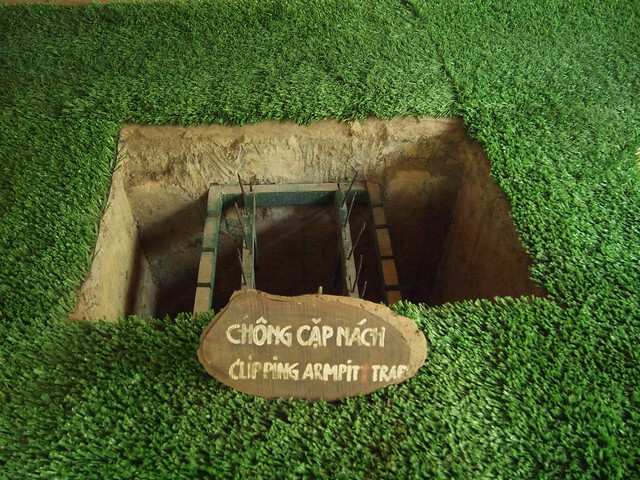
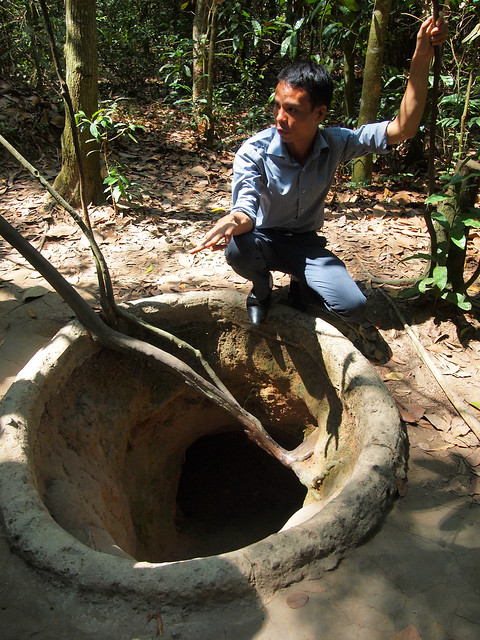
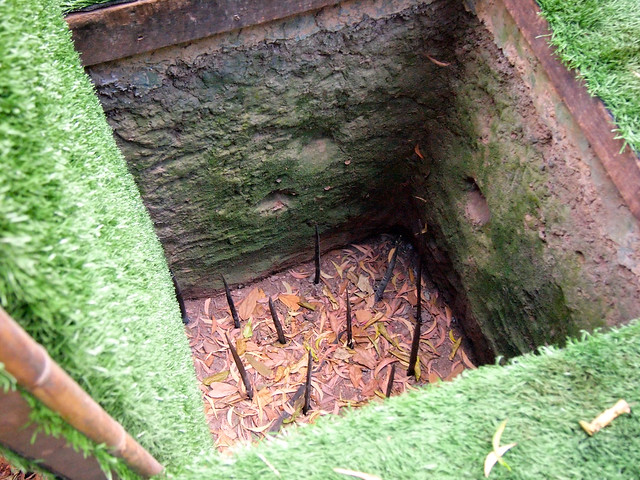
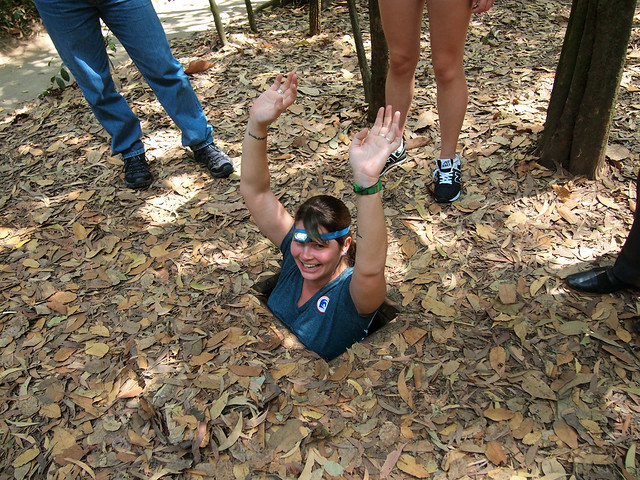
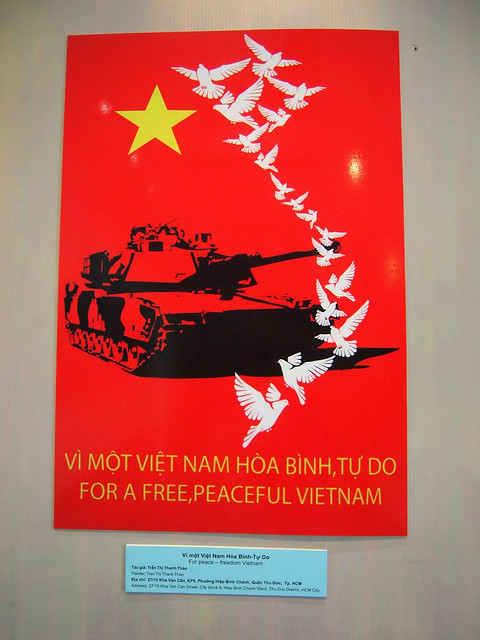
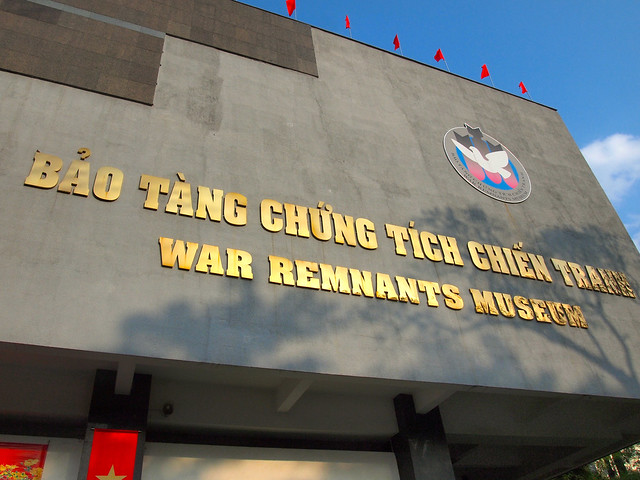
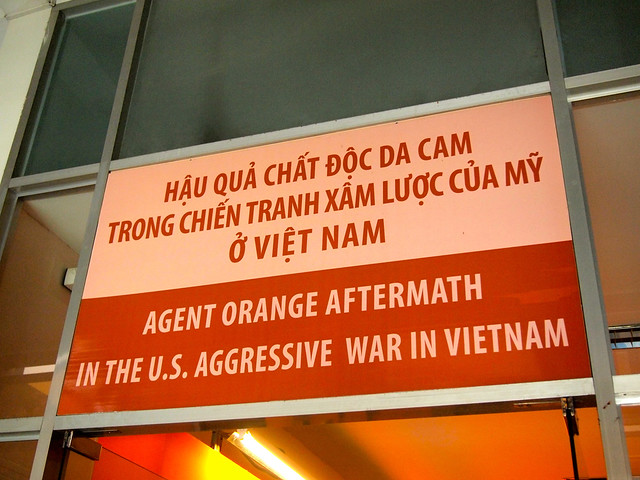
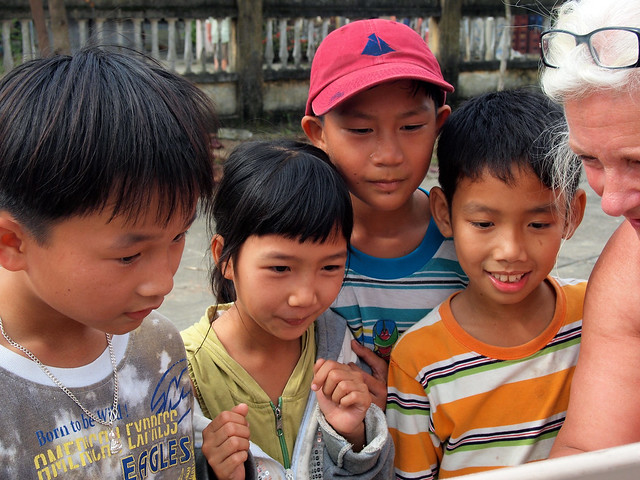
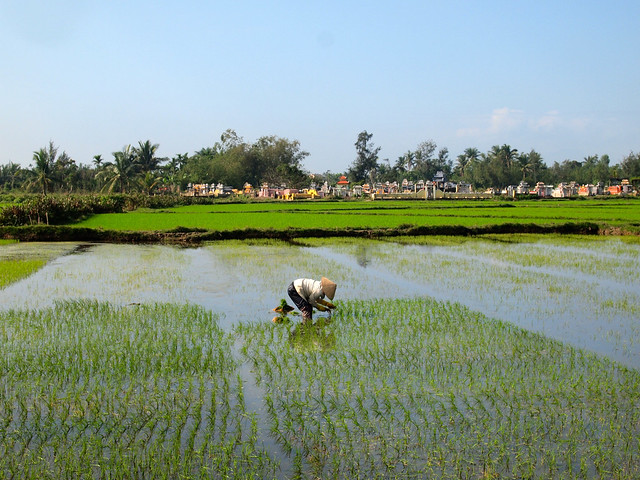









I am an American and will say this post is a very white privileged post.
You were uncomfortable with the light shined on white people.
What is the other side of the story? Yes, many American soldiers were sent against their will and became traumatized.
But was it our land? Were millions of our civilians killed because another country wasn’t happy with what kind of government we had?
No. So for you to say it was one sided is not okay. American aggression in Vietnam was NOT okay.
Normal sane people will know a countries past aggressions don’t reflect all the citizens there. So there was no point in you even writing a post about it.
I’m not sure you read my whole post. I was NOT saying the war in Vietnam was okay. The one-sided-ness I was referring to was how a museum was presented. Not the war itself. Never did I say that American aggression in Vietnam was okay. And as for your point that “Normal sane people will know a countries past aggressions don’t reflect all the citizens there,” well that’s clearly not true since I had a LOT of people asking me if it was okay to go to Vietnam as an American. In the US, we have a hard time separating the people of a country from their government (see: the Middle East), and many Americans assume this is true in other countries, too.
That toottallly explains the huge wave of migration from N. Vietnam to S. Vietnam (with the N. Vietnamese government arresting, detaining, and even shooting Vietnamese who tried to escape to the South), and it toottallly explains the decades of migration after the fall of Saigon of people trying to escape the N. Vietnamese government, lending to over 1 million Vietnamese living in the U.S. today.
Even today, in S. Vietnam, you’ll find many veterans who think America’s crime in the Vietnam war was not being involved, but abandoning S. Vietnam to be taken over by the North.
The migration went both ways, Ngo Dinh Diem ruled the south as a dictator with American blessing, and the U.S. prevented the elections that the Geneva Accords called for in 1956 from happening because the Eisenhower administration knew Ho Chi Minh would win. You also have to understand that more than a few Vietnamese collaborated with French colonial rule. Those people were in danger just as those who collaborated with the Americans in South Vietnam were in danger after 1973. It’s what happens after revolutions. Those in the American colonies who collaborated with the British — British loyalists — also were in danger at the conclusion of the American Revolution. Many loyalists left — went to Canada, British colonies in the Caribbean, or to Britain — and lost their property in the new USA in the process.
This is why you need to read some books. Right now, you don’t know what you’re talking about.
Dear Amanda,
As a Vietnamese, I would like to send you our sorry for the confusion caused by those tourism sites.
Those sites exist to serve one main purpose: to send an anti-war message to everyone. I means they are not meant to deliver any hate message to America or Americans. I have to admit, their original purpose were to propagate our victory over America. The War Remnants Museum was named the America and South Vietnam War Crimes Museum. But we and our government understood that you and your countryman was somehow mistakenly accused. We decided to focus on teaching people about war instead.
Even in our history books, we recorded the American’s anti-war movement. Our books told us about young Americans forced to join the war against their will, and we appreciate all the good will.
There was one thing we learnt to finish that war, was identifying the correct culprit that caused war to happen. It weren’t the Americans in this case, it was the America’s government at the time (nothing to do with the current government you have).
Wars have always been, and will always be between governments. When war is over, only governments win. People and soldiers always loose. This is the ultimate lesson I learnt from our war. I would certainly hope everyone can learn the same thing.
“When war is over, only governments win. People and soldiers always loose.” This is so, so true – thank you so much for sharing this perspective! It was my experience in Vietnam, too – the people were nothing but kind to me.
” There was one thing we learnt to finish that war, was identifying the correct culprit that caused war to happen. It weren’t the Americans in this case, it was the America’s government at the time …”
It was the North Vietnamese government that invaded South Vietnam. If the North didn’t invade the South, there would’ve been no war. Simple as that.
This is perhaps the dumbest thing I’ve ever heard someone say about the American war in Vietnam. Please read a book or two about the war. Frances Fitzgerald’s Fire in the Lake and George Herring’s America’s Longest War are good places to start.
It’s a matter of basic fact.
Geneva Conference split Vietnam into two nations — one “communist” and the other “republican”. North Vietnam didn’t like that situation, and thought they had the right to impose “communism” on all Vietnamese people, so they sponsored the Viet Cong (the Viet Cong were strongly bolstered by the Ho Chi Minh Trail, including a huge portion of their manpower) to attack American theaters and other “imperialist sympathizers” and invaded S. Vietnam directly.
If it wasn’t for N. Vietnam, there would’ve been no war (as long as the U.S. kept its promise to back off and promote Vietnamese self-rule in S. Vietnam, and the corrupt S. Vietnamese government curtailed its corruption and become a true Republican government to maintain legitimacy).
The Geneva Accord was a travesty, with the U.S. sticking its nose into something that was none of its business and insisting on a split Vietnam after the French lost their war to regain their colony in Indochina. Most Vietnamese, furthermore, did not want their country split in two. Otherwise, I’m not going to explain it to you, Corey. This is why you need to read some books.
I have been to Vietnam two times, 2016 and 2017. Both times to Ho Chi Minh City.
I found the Vietnamese people very welcoming and interested in America. Never felt in danger, I actually felt safer there than our USA cities. The War Remnants Museum is pretty one sided, but gave me some insight on their point of view that I never thought of before. I would recommend a visit.
Keep an open mind, be polite ,don’t talk about politics.
This post reflects the worst of American exceptionalism, the belief that the US is different from and better than all other countries. As a result, your post makes some rather bizarre historical claims.
Claim #1: American soldiers suffered, too. Yes, they did, but you have absolutely no sense of scale. Two million Vietnamese were killed in the 8 years of the American war; around 1 million Vietnamese were wounded; and around 300,000 are still missing. Plus the long-term effects of Agent Orange and all the bombs and mines left behind. The vast majority of these casualties were caused by the enormous military machine that the US used against a people who didn’t have the means to even come close to matching US firepower. There is no comparing the suffering of Americans and Vietnamese. It’s grotesque that you try to make this comparison
Claim #2: You want us to focus on the actions of individual soldiers. That is so beside the point. US military policy in Vietnam was monstrous. The US pursued a body count strategy in Vietnam that sought to kill as many people as possible in the belief that doing so would eventually exhaust the NVA and NLF because they would run out of people to fight the war. See the documentary The Fog of War and Nick Turse’s Kill Anything that Moves. Any standard history of the American war will also discuss the body count strategy.
Claim #3: you want to focus on American opposition to the war, but you exaggerate the level of opposition to the war both inside the US military and in the American civilian population. I’m not going to explain this to you. Instead, you should go read some books by reputable historians about the US in the 1960s and the Vietnam War.
One of the previous comments in this thread asserted that South Vietnam invited the US to help them resist reunification of the country under a communist government after the 1954 Geneva Accords ended the war with France and expelled the French. This is a ridiculous claim.
1. The US insisted that the country be split in 1954.
2. The rationale for this inside the Eisenhower admin was that the country would never be unified.
3. The US prevented the elections to reunify the country that the Geneva Accords called for in 1956 because the Eisenhower admin knew Ho Chi Minh would win an open election
4. Eisenhower picked Ngo Dinh Diem to lead the new South Vietnam that the US created by insisting on the division of the country in 1954.
5. Ergo, the South Vietnamese could not legitimately ask the US for anything because the US created South Vietnam.
Claim # 5: you describe the content of the War Remnants Museum as “one sided anti-American propaganda.” I was at the museum 3 days ago and as an academic historian who has been studying Vietnam for several decades, l didn’t see anything that doesn’t appear in reputable histories of the Vietnam War or that was factually inaccurate. You might not like the story that the museum tells about the USA, but that doesn’t make it “propaganda.” You pointed out that some captions refer to the US military as the “American Killers.” Ok, what would you call a group of people who invaded the US and killed millions; killed civilians in droves, including women, children, and the Infirm; raped hundreds, maybe thousands of women; burned cities and towns to the ground; and sprayed millions and millions of gallons of a deadly herbicide that killed tens of thousands, caused dreadfully painful forms of cancer, remained in the water supply and soil for decades, and caused at least 300,000 children to be born with the most hideous birth defects you can imagine up to the current day? I’m sure you’d use a much stronger word than “killer.” I thought the curators of the War Remnants Museum let the US military off easy by merely calling them “killers.” Given all that the US did in Vietnam, furthermore, “killer” is an objectively accurate description. Look at what the US did and think of word(s) that accurately describe those actions. If the shoe fits …
I also cannot figure out what the “other side” of the Vietnam War is. Do you think that there is a “side” that can justify killing millions; killing civilians in droves, including women, children, and the Infirm; raping hundreds, maybe thousands of women; burning villages to the ground; and spraying millions and millions of gallons of a deadly herbicide that killed tens of thousands, caused dreadfully painful forms of cancer, remained in the water supply and soil for decades, and caused at least 300,000 children to be born with the most hideous birth defects you can imagine up to the current day? All in the name of protecting a county– South Vietnam — that didn’t exist until the United States willed it into existence.
Our country isn’t exceptional. Sometimes we are just wrong. Just like every other country.
Nice article…but again there are always many different thoughts even within the American camp.
I have studied the war in great detail. About 2/3 of the solders volunteered. Obviously more at the start of the war than later. The common theme was that the men felt a patriotic duty to serve just as their father/uncle had in WWII or Korea.
Why were we there? Basically we became deeply involved back in the very early 50’s due to the communist attacks in Korea. We tried desperately to avoid the war, even offering large foreign aid to North Vietnam which they refused.
People like to talk about My Lai which of course was bad but nothing compared to North Vietnams preplanned slaughter of thousands in Hue….the list goes on an on.
With the spread of communism including Korea, USSR taking of eastern Germany/Eastern Europe in 1961 and the Cuban missile crisis in 1962, it would have been almost impossible for us to allow South Vietnam to “fall” without a fight.
A common saying is that “we lost the battle but not the war.” I think ours should be,” We lost the war but not the battle.” We repaid USSR proxy war with our own in Afghanistan. The Soviet Union finally crumbled and what is left of Communism has adapted to a more “capitalist global enterprise.”
You have such a sincere, down-to-earth writing style 🙂 I really enjoyed reading through everything. As a Vietnamese born, I must say that your points about the Vietnamese are very true.
If you ever come back to Saigon and want to discover more historical sites, check out this article that I recently wrote: https://blog.inspitrip.com/2202/5-most-neglected-war-sites-in-saigon-and-how-to-discover-them/.
Hope you’ll like it!
Thanks very much, Alexis. 🙂
It is simply not the case that the US invaded Vietnam without a reason, and it is ludicrous to claim that the majority of Americans believe this to be true.
The stated purpose was to stem the spread of Communism. The East and Weat were involved in a battle for world dominance at the time. Does the Cold War ring a bell? This was not simply a war between the US and Vietnam. It was democratic forces versus communism. More directly, it was the US and allies coming to the aid of the people in southern Vietnam who wanted their country to be free and democratic.
Of course, there are many who believe the war to have been unjust, regardless of its purpose. That is a debate which will go on forever. But, to claim that it is a mystery as to why the war occurred is incredibly uninformed.
Furthermore, while certain tactics employed by the US were arguably inhumane, the barbarism of the traps employed by the enemy were just as bad, or worse. We, as a nation have decried the use of napalm etc. From your blog, it appears that the Vetnamese still take pleasure in the suffering that their booby traps inflicted on soldiers.
On the flip side, I’ve talked to many Vietnamese, especially living in HCMC, who speak *positively* of America’s involvement, and our “crime” to Vietnam was abandoning them and leaving them at the hands of the communists. There are people local to Saigon who remember, through their parents and grandparents, America as a friend who defended their freedoms.
There are Vietnamese of Hue, who don’t have parents and grandparents, because they were executed for “anti-revolutionary” ideas, who’ve heard stories from their parents about their parent’s friends — children — being buried in mass graves.
There are Vietnamese who remember why America was fighting in Vietnam better than America does.
There’s videos documenting an *entire city* desperate for America’s protection as the North invaded Saigon. Videos of people chasing down an airplane taking off on their motorbikes to try to get on, people clinging onto the airplane as it enters the air and falling off.
Videos of US Navy sailors pushing helicopters off their ships one after the other to make room for more helicopters to land, all full of refugees as America abandoned Vietnam. There were hundreds of helicopters full of refugees flying blindly into the pacific hoping to find anything away from the Viet Cong.
America did some ugly things in Vietnam, but let’s not act like those weren’t done with good intentions. There’s a pretty good reason there are so many Vietnamese living in the US today.
I suppose we can just be thankful the US held off power in Vietnam long enough so that the government could see the benefits of opening up, rather than the closed North Korea-like state it was originally.
And let’s not act like it was US vs. Vietnam. We were invited to fight in a civil war. We were *allies* of Vietnam.
I’m not against the current Vietnam government. Actually, I subscribe to communist principles. But I definitely think the Viet Cong were a people worth fighting against.
Vietnamese people are really nice people. Actually the people are kind and respectful in entire southeast Asia (Cambodia, Thailand, Vietnam). Americans and Vietnamese people met each other in wrong way. So just as you say, tourism is good for building strong relationships and understand each other.